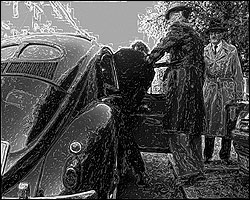The Red Orchestra was not an orchestrated anti-Nazi resistance movement at all. It was more like one of those Charles Ives compositions in which different marching bands would march past one another playing different tunes in the same style. As Hitler crushed his fist around Berlin in 1933, Red Orchestra dissidents began subverting him, smuggling food and letters to his victims, slipping information to Americans and (much more) to Russians, wheeling illicit radio equipment in baby carriages. In what must have been their most fun transgression, they would pair up and pretend to be moonstruck lovers smooching and leaning against lampposts, while the girl surreptitiously pasted a handbill against the lamppost: “The Nazi paradise—war, hunger, lies, Gestapo—how much longer?” It didn’t last long. The Nazis picked up their broadcasts in 1942, arrested 100 Red Orchestra members, put 49 on meat hooks, and sent the rest to concentration camps or prison.
Some survived, like Helmut Roloff, whose son, Stefan, made this 2003 German TV documentary about him and his bold colleagues. But their bravery was bitterly rewarded. Postwar West Germany punished them for collaborating with Commies, even though many of them weren’t. (Some of the ex-Nazis who tortured them were later rewarded with new West German identities and jobs in the Cold War fight against the Commies.) East Germany hailed them as forerunners of the Stasi, its evil secret police, which further muddled the group’s legacy.
Stefan Roloff is an innovative documentarian. He colorizes newsreel footage of Germany burning and Nazi crimes. He re-enacts some actions in footage manipulated like a black-and-white version of the a-ha video “Take on Me,” and computer- processes the Red Orchestra’s mug shots, morphing the shocked faces into one another. The effects are striking, often evocative.
But Roloff is a hopelessly incompetent director. His interviews suck, making an astounding true story boring. Also, we don’t know exactly how true everything is. Since he doesn’t bother to tell us Helmut is his father, it seems possible that there’s some special pleading going on. Obviously Red Orchestra folks were the good guys, but if there were unheroic human moments or a pro-Soviet wing doing party-line mischief after the war, I’m not at all sure he’d tell us. The movie cries out for an objective narrator to make sense of this fascinating historical episode. Roloff sure can’t. (NR)








